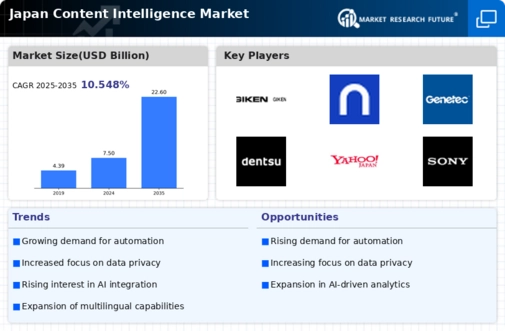Adoption of Cloud-Based Solutions
There is a significant shift towards the adoption of cloud-based solutions in the content intelligence market in Japan. This trend is driven by the increasing need for scalability, flexibility, and cost-effectiveness in content management. Businesses are increasingly migrating to cloud platforms to leverage advanced content intelligence tools that facilitate real-time data analysis and collaboration. The market is anticipated to grow as organizations seek to enhance operational efficiency and streamline content workflows. Cloud-based solutions offer the advantage of accessibility and integration with other digital tools, enabling companies to harness the full potential of their content strategies. This transition is likely to play a pivotal role in shaping the future of the content intelligence market.
Rising Demand for Data-Driven Insights
The market in Japan experiences a notable surge in demand for data-driven insights. Businesses increasingly recognize the value of leveraging data analytics to enhance decision-making processes. This trend is reflected in the growing investment in content intelligence solutions, which are projected to reach approximately $1.5 billion by 2026. Companies are seeking to optimize their content strategies, improve customer engagement, and drive revenue growth through informed insights. As organizations strive to remain competitive, the need for actionable data becomes paramount, thereby propelling the content intelligence market forward. The integration of advanced analytics tools enables firms to extract meaningful patterns from vast datasets, fostering a culture of data-centricity that is likely to shape the future landscape of the industry.
Integration of Multilingual Capabilities
In Japan, there is a growing emphasis on the integration of multilingual capabilities in the content intelligence market. As businesses expand their reach to diverse consumer bases, the ability to analyze and generate content in multiple languages becomes essential. This trend is particularly relevant in a linguistically rich environment like Japan, where companies are increasingly adopting content intelligence solutions that support various languages. The market is expected to see a rise in demand for tools that facilitate seamless content translation and localization, enhancing user experience and engagement. By catering to a broader audience, organizations can leverage content intelligence to drive brand loyalty and market penetration, thereby contributing to the overall growth of the industry.
Expansion of Digital Marketing Strategies
In Japan, the content intelligence market is significantly influenced by the expansion of digital marketing strategies. As businesses pivot towards online platforms, the necessity for effective content management and optimization becomes increasingly critical. The market is projected to grow at a CAGR of 15% over the next five years, driven by the need for enhanced customer targeting and engagement. Companies are investing in content intelligence solutions to analyze consumer behavior and preferences, allowing for tailored marketing campaigns that resonate with specific audiences. This shift towards digitalization not only enhances brand visibility but also fosters deeper connections with consumers, thereby driving the growth of the content intelligence market.
Increased Focus on Content Quality and Relevance
In the context of the content intelligence market, there is a marked increase in the focus on content quality and relevance among Japanese businesses. Organizations are recognizing that high-quality content is crucial for attracting and retaining customers. This shift is prompting investments in content intelligence solutions that enable firms to assess content performance and optimize it for better engagement. The market is projected to grow as companies prioritize content strategies that align with consumer expectations and preferences. By utilizing advanced analytics, businesses can ensure that their content not only meets quality standards but also resonates with target audiences, thereby enhancing brand reputation and driving sales.























Leave a Comment